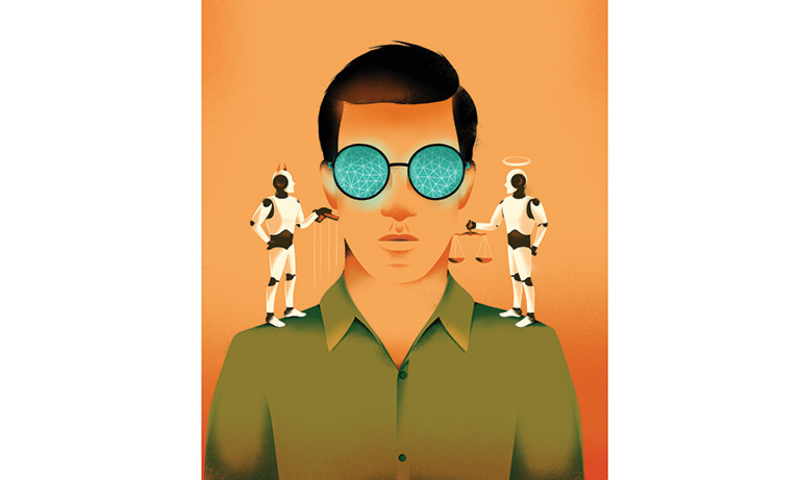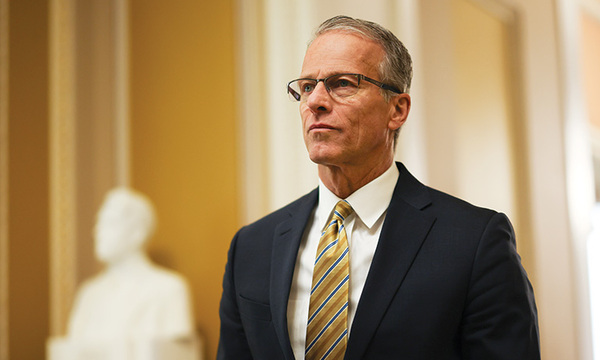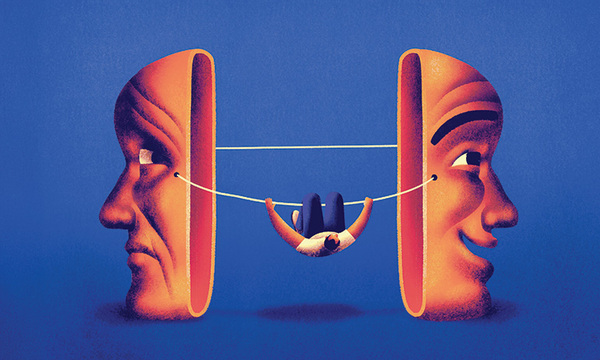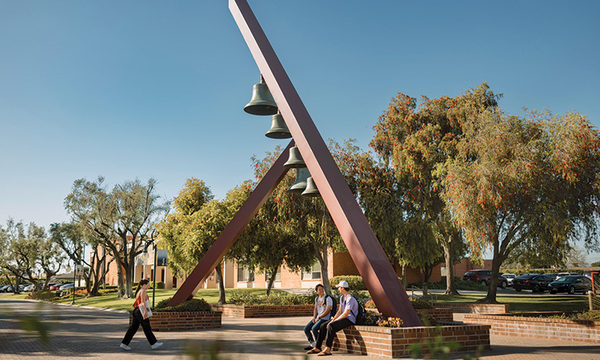As he logged into the Zoom call, all Dr. Michael Arena could do was laugh.
Expecting a lively discussion with a small group of tech professionals, he instead found himself staring at a grid of silent AI agents тАФ virtual notetakers sent by other would-be attendees whoтАЩd canceled last-minute.
Alone on the screen, ArenaтАЩs face was framed by four blank squares тАФ bots poised to capture his every word.
тАЬIтАЩm sitting here thinking, Oh my goodness, IтАЩve met the world of robots,тАЭ said Arena, dean of Biola UniversityтАЩs Crowell School of Business. тАЬWhat am I supposed to do? I canтАЩt have a conversation with the notetakers.тАЭ
Thankfully, a couple of the participants ended up logging in for a real human conversation. But for Arena, the experience was just the latest eye-opening moment in the increasingly strange new world of artificial intelligence.
In just a few years, AI has surged into daily life, captivating imaginations and reshaping how we live, work and connect. Once the stuff of science fiction, AI is now everywhere: chatbots, self-driving cars, AI-generated art тАФ and yes, even notetaking virtual assistants. The advances have stirred excitement about breakthroughs in healthcare, education and productivity, but have also sparked urgent questions about ethics, security and what it means to be human.
As the AI revolution accelerates, how should Christians navigate its promise and perils?
тАЬThis is unlike any technological innovation weтАЩve ever seen because it touches everything,тАЭ Arena said. тАЬThe closest thing we can think of is electricity, but electricity had a slow adoption rate. This touches everything, and with high degrees of velocity. So I think we should all fasten our seat belts and hold on.тАЭ
1. Know the basics
The first step in preparing for an AI-transformed world is to understand what artificial intelligence is тАФ and isnтАЩt, said Dr. David Bourgeois, associate dean at Crowell and director of the universityтАЩs Artificial Intelligence Lab.
тАЬWhat IтАЩm finding happens a lot right now is that people say AI when all they really mean is technology, but they call it AI because it sounds more interesting, maybe even more funding-worthy,тАЭ Bourgeois said.
One of BourgeoisтАЩ first actions after launching BiolaтАЩs AI Lab in the spring of 2024 was to develop an (available at biola.edu/ai-lab/resources), which offers an entry-level overview of how to understand and think about AI.
Simply put, artificial intelligence is a computer-based application designed to mimic human intelligence and behavior. Drawing upon existing data sources тАФ which can include books, articles, artwork, videos, the vast reaches of the internet, etc. тАФ sophisticated machine algorithms are trained to accomplish tasks. AI models tend to be classified into two basic approaches: Generative AI creates content, such as text, illustrations and music. Discriminative AI classifies data, useful for everything from credit risk assessments to enabling self-driving cars to recognize objects on the road.
Forms of AI have been around for decades, and technology enthusiasts have seen many тАЬAI hype cyclesтАЭ come and go, said Bourgeois, whose Ph.D. and professional background are in information systems and technology. WhatтАЩs changed over the past few years, he said, is the sheer amount of data available, the speed of transactions and the significant advancements in programming methods тАФ all of which have grown by orders of magnitude. The launch of ChatGPT in November 2022, which opened the general publicтАЩs eyes to the possibilities of generative AI, marked a key turning point.
тАЬThis isnтАЩt just a hype cycle,тАЭ he said. тАЬThe advancements made in AI тАФ and in generative AI specifically тАФ have gotten to a point where theyтАЩre now impacting our daily lives personally, along with companies and businesses.тАЭ
2. Embrace the potential
Over the past two decades, Dr. Yohan Lee has had a front-row seat for some of the most exciting developments in the use of artificial intelligence.
In a variety of roles тАФ postdoctoral fellow at the National Institutes of Health, a chief technologist at Booz Allen Hamilton, principal investigator at Google AI, among others тАФ Lee has specialized in using AI for biomedical research, education and business. His Silicon Valley startup company, Scaled Entelechy, recently earned recognition from the U.S. governmentтАЩs National Artificial Intelligence Initiative Office.
Now, as associate dean of technology in BiolaтАЩs School of Science, Technology and Health, one of his aims is to help students and faculty members embrace the responsible and innovative use of AI for Christ-honoring purposes.
тАЬIтАЩve always thought machine learning could help us do some incredible things that we couldnтАЩt do on our own,тАЭ Lee said. тАЬIt could take us into areas of exploration, both scientifically and academically, that become an incredible opportunity to discover things that our normal human intuition may not see.тАЭ
Within BiolaтАЩs technology division, faculty and student researchers are working on a range of projects, including exploring uses of and enhancements to translation tools, which can allow for those who donтАЩt speak English to instantly translate conversations not only to their primary language, but to their specific dialect. That sort of technology could make an immense difference for doctors who are providing aftercare instructions to surgery patients or help a parent to avoid a life-threatening incident with medication, Lee said. Others in the division are experimenting with how to build their own AI for robotics, autonomy or decontamination tools for use in countries where clean water is not available.
тАЬYou can do some pretty amazing things with AI to develop new micro-contaminant filtering technologies at a cost thatтАЩs both approachable and scalable,тАЭ Lee said. тАЬIf we get to apply AI to some of those micro- and nanomaterial cellular structures, you would be able to filter chemical contaminants, biological contaminants, pathogens, etc. тАФ and you could do it potentially in a straw.тАЭ
Across industries, proponents of AI see virtually limitless opportunities to save time, improve efficiency and encourage innovation.
In medicine, AI is expected to diagnose illnesses, discover cures and assist in surgeries тАФ reducing error and cost. In business, AI will increasingly be tapped to code websites, analyze financial data, generate reports, compose emails, develop creative campaigns, design presentations and automate routine tasks. In missions, theyтАЩll aid in Bible translation and contextualization.
In education, AI tutors will offer personalized teaching to students on multiple topics, with lessons and techniques customized to their current knowledge and learning preferences. AI tools will also make it exponentially easier for ╗╞╣╧╩╙╞╡ students, for example, to find relevant sources and research. Arena, who previously held executive roles at Amazon Web Services and General Motors, was floored when he recently put ChatGPTтАЩs deep research function to the test. After asking for a roundup of academic research from the past decade in his niche area of expertise, he walked away for a short break and came back to a detailed, accurate report citing all of the major scientists and theorists in the field.
тАЬThat is a literature review that would have taken me months to build тАФ and it took 25 minutes,тАЭ Arena said. тАЬIt blew my mind.тАЭ
3. Understand the dangers
For all of the upsides to AI, experts are also quick to express major concerns about the ways it could change our world in the decades to come.
Stefan Jungmichel (MBA тАЩ24) has made it his personal mission to help Christians think critically about both the opportunities and dangers posed by AI. As co-founder and program manager of BiolaтАЩs AI Lab, he spends many of his days consulting with students and faculty members, providing demonstrations and advice about the latest tools and trends in AI.
And while heтАЩs an avid user, heтАЩs also gravely concerned about the dangers posed by AI тАФ a topic he explores in detail in a book he recently co authored, .
Among his many concerns are an erosion of trust that will come as generative AI continues to produce ever-more-realistic images and videos and generate authoritative-seeming results built on inaccurate or biased data.
тАЬYou donтАЩt know what you can trust on the internet,тАЭ he said. тАЬYou see a picture and you donтАЩt know if itтАЩs real or not.тАЭ ThereтАЩs also the likelihood of more people detaching from the real world in favor of increasingly vivid virtual realities and AI тАЬfriendsтАЭ or romantic partners. Jungmichel points to Character. AI, a tool that allows users to have conversations and form relationships with celebrities and fictional characters тАФ mimicking the voices and personalities of everyone from Justin Bieber to SpongeBob SquarePants.
Even more concerning is what could happen if humans lose control of AI systems. Already, cases have been documented of AI using deception and finding creative loopholes to achieve its objectives тАФ including hiring a human to click an тАЬIтАЩm not a robotтАЭ button on its behalf while pretending to be blind. Even with guardrails and regulations in place, Jungmichel said it doesnтАЩt take much imagination to start envisioning some of the worst-case scenarios.
The rapid spread of AI has also generated concerns about privacy тАФ including what happens to all of the information, photos, documents and data that people feed into their prompts.
тАЬAnything you put on a commercial AIтАЩs tool, one that is run by a major corporation, you are giving that data to that tool,тАЭ Lee said. тАЬYou have to ask yourself: Is what IтАЩm putting into this tool to make my life easier or faster тАФ writing a summary or a briefing note or a calculation тАФ actually putting my company at risk by exposing [that data]? Whatever you put out there will stay on there and it will be now known by that system.тАЭ
For his part, Bourgeois fears what will happen to peopleтАЩs creativity and capacity for critical thinking when they become dependent on AI as a shortcut.
тАЬAs humans, we donтАЩt have a good track record of using technology that gives us power, so to speak, to become our best selves. We want to become our laziest selves or our most self-centered selves.тАЭ he said. тАЬThe temptation with AI тАФ generative AI, in particular тАФ is to outsource your thinking to it and to let it do the stuff you donтАЩt want to do.тАЭ
We need to resist that urge by using generative AI as a supplement or enhancement only after weтАЩve first wrestled through ideas on our own, he said.
тАЬWe need to make sure that thereтАЩs friction in our lives,тАЭ he said. тАЬAI has the potential to try to reduce as much friction as possible, so that youтАЩre living a friction-free life. тАж But in that case, youтАЩre not learning. YouтАЩre not engaging. YouтАЩre not growing or maturing.тАЭ
4. Fight FOBO
As the use of AI has spread, so has the phenomenon of FOBO тАФ the fear of becoming obsolete. Nearly a quarter of U.S. workers worry that technological advancements will result in the elimination of their jobs, according to a 2023 Gallup poll.
Other forecasts are more optimistic, but still point to major shifts. The World Economic Forum estimates that over the next five years, AI will be a net positive for job growth тАФ creating 11 million jobs while displacing 9 million тАФ according to the organizationтАЩs Future of Work Report 2025. At the same time, the report predicts a sharp rise in the share of work tasks that will be performed primarily by machines and algorithms тАФ from 22% today to 35% by 2030.
As organizations grapple with how to adapt, Bourgeois said itтАЩs vital for both entry-level and experienced workers to level up their knowledge and skills in the use of AI.
тАЬThe pat answer is that AI is not going to take your job, but someone who knows how to use AI is going to take your job, and I think thatтАЩs probably true,тАЭ Bourgeois said. тАЬThe best way to prepare is to learn your craft and be very good at it, and then know how to use AI to enhance that.тАЭ
As a practical step, Jungmichel encourages his visitors in the AI Lab to explore as many tools as possible тАФ even to prompt ChatGPT for advice on which tools to use in a personтАЩs specific job, along with detailed instructions and ideas for how to start implementing these tools. In his own work, heтАЩs prompted ChatGPT to curate a twice-daily roundup of updates about noteworthy AI tools and developments. He also follows an assortment of AI-focused accounts on the X platform. (The AI Lab gathers the most helpful of those findings тАФ including AI-related news, resources and video demonstrations of new tools тАФ into a , with subscriptions available at biola.edu/ai-lab.)
Yet even as the demand for AI-fluent employees grows, the shifts also highlight the importance of developing skills in the areas that set people apart from machines.
That combination is one of the ideas fueling BiolaтАЩs new Adaptive MBA program, Arena said. The innovative program seeks to help students harness the latest technologies and tools through AI business sprints and intensive workshops with industry experts. But it also focuses on cultivating enduring business skills and time-tested Christian principles.
тАЬThe question becomes, what are the human-centric skills that will be difficult for AI to replicate, and how do we elevate those?тАЭ Arena said. тАЬThatтАЩs what we call future-proofing your career. тАж A business education needs to be pivoting toward those human-centric things like emotional intelligence, social influencing, adaptive leadership, high judgment and ethical reasoning.тАЭ
5. Pursue biblical wisdom
Given the many concerns over the ethics, safety and destructive impacts of AI, some Christians may be tempted to withdraw and seek to avoid the technology altogether. But Jungmichel and others argue that the potential dangers and negative societal impacts of AI are even more of a reason for Christians to be leading the way in how these tools are developed and adopted.
тАЬAI is coming whether we like it or not,тАЭ Jungmichel said. тАЬThe benefits and potentials are way too high, and that has been decided a long time ago. But we have the opportunity of shaping it тАФ and I want to make sure Christian values are shaping it.тАЭ
Arena agrees. Part of his motivation for championing AI at Biola is his concern about what could happen if believers donтАЩt provide leadership and ethical influence in the development of new technologies.
тАЬHereтАЩs my big fear: I worked in the technical community long enough to know that if you ask a technologist тАШCan you do something?тАЩ their first response is тАШIs it technically feasible to do what you just asked me to do?тАЩ And very often the answer is yes,тАЭ he said. тАЬBut then we need to ask the much more existential question: Should we do it? And thatтАЩs a much more difficult journey.тАЭ
To help Christians identify some of the ethical and theological issues at stake, leaders at Biola developed a document titled тАЬBiblical Principles for Understanding and Using Artificial Intelligence,тАЭ available at biola.edu/ai-lab/resources. Written and reviewed by experts in business, technology, theology and philosophy, the document provides practical guidance on the use and abuse of AI while unpacking three overarching biblical principles:
- We are to seek knowledge and wisdom from God and his Word first and then from wise Christians (Prov. 1:7, Col 2:8).
- We are made in the image of God. As bearers of his image, we are creative and relational beings (Gen. 1:26-27, 2:15, 2:18).
- We have been commanded to steward the resources God has given us and do it to his glory (Gen. 1:28, 1 Cor. 10:31).
Beyond the document, the university has also launched the new EngageX lecture series, which in its first year has brought in leading experts to discuss the geopolitical, social, ethical and theological implications of AI. (Find upcoming events and view past lectures at biola.edu/engage-x.)
Lee, who spoke at one of the events on тАЬA Redemptive AI Future,тАЭ said that for all of the legitimate concerns about AI, heтАЩs hopeful about the role Christians can play, especially if they тАЬcome to the table with a more sophisticated, nuanced, affirming and ultimately valuable set of contributions.тАЭ
тАЬSecular technologists are now open to questions about faith and conversations about faith because they are being challenged on what their assumptions were about for what it means to be human,тАЭ he said. тАЬThey are looking for answers that are true, steadfast, reliable and irrefutable. As humans, we need something real that we can lean on. And the gospel is the most real thing that can change the lives of folks who are now being disillusioned.тАЭ
Illustration by S├йbastien Thibault
 Biola University
Biola University




